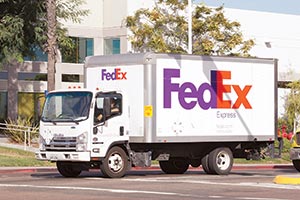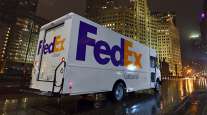FedEx’s Profits Increase 18% On Growth at Express Unit

This story appears in the March 21 print edition of Transport Topics.
FedEx Corp. last week said its fiscal third-quarter net income rose 18% to $692 million, or $2.51 per share, excluding one-time costs and powered solely by higher profits at its Express unit.
Express profit before interest and taxes for the quarter ended Feb. 29 rose 51% to $595 million, However, the Ground unit’s profit on that basis slipped $2 million to $557 million, and Freight’s results dipped 16% to $56 million. Overall revenue rose 8% to $12.7 billion for the quarter, with all of the increase at the Ground unit.
“Our strong financial performance was driven by increasing demand for our broad portfolio of FedEx business solutions, which helped increase revenue and adjusted profit,” CEO and founder Frederick Smith said in a statement.
Express results were helped by yield management and profit improvement efforts and by 2% higher domestic volume. Revenue dropped 1% to $6.56 billion.
At Ground, revenue rose 30% to $4.41 billion, reflecting the acquisition of logistics operator Genco and new accounting for SmartPost revenue. Ground profit was hurt by higher costs due to network expansion and holiday season demand that exceeded expectations and capacity. Conversely, Ground was helped by 11% higher volume and 8% higher revenue per package, but its operating ratio worsened to 87.4 from 83.5.
Freight’s results worsened because of higher salary and benefit costs. Daily Freight shipments rose 7%. Revenue was 1% higher at $1.45 billion, but the operating ratio worsened to 96.1. Profitability was hurt by an 8% rise in wage costs. Economy shipments rose 12%, and priority freight increased 4%. LTL wages and salaries rose by $51 million. In total, revenue per 100 pounds of freight declined.
During a conference call, Smith and Executive Vice President Mike Glenn delivered a spirited defense of FedEx’s business model at a time when e-commerce is expanding and Amazon is enhancing its own logistics capabilities.
Glenn outlined a “daunting task” costing tens of billions of dollars for Amazon to build a network like what FedEx has, saying Amazon is “a valued customer.”
He said Amazon’s recent logistics actions are consistent with the approach of other retailers that have long had their own freight networks to manage inventory.
Smith said companies such as FedEx and UPS alone are capable of achieving operational success through route density and revenue per delivery stop that others can’t duplicate. He criticized “fantastical” reports relating to Amazon, saying the unidentified authors were “devoid of knowledge” about the package industry.
“Recent concerns regarding new parcel entrants (in particular, Amazon) appear overstated,” Benjamin Hartford wrote in a report from Robert W. Baird & Co. “We expect FedEx. UPS and the U.S. Postal Service combined(which currently represent over 95% of business-to- consumer [parcel deliveries] to remain the dominant . . . service providers in coming years.”
E-commerce also is further changing the way FedEx is pricing and moving its freight, Glenn said. Specifically, FedEx has had to cope with online orders of products such as mattresses, canoes and big-screen televisions that don’t fit in its sorting network. As a result, facilities are being modified and expanded, and a 48-inch package length limit will be established later this year, he said.
Meanwhile, the one-time costs in the quarter included $204 million to settle all of the 19 multidistrict worker status cases in the appeals stage at the Ground unit. Those cases involve independent contractor status for workers and date back a decade or more.
FedEx changed the independent contractor model in 2011 to address that contractor issue, and the company said it would continue to defend cases that are not in the multidistrict litigation.
FedEx, based in Memphis, Tennessee, earned $507 million, or $1.84, including one-time costs. In the year-earlier period, net income was $586 million, or $2.03 per share, excluding a one-time gain. The company ranks No. 2 on the Transport Topics Top 100 list of the largest for-hire carriers in the United States and Canada.
An additional $92 million in one-time costs resulted from litigation and costs relating to the planned acquisition of TNT Express. FedEx still expects to complete that deal in the first half because approval has been received from all but three nations. Company officials declined to provide any gauge of financial benefits before completion.
The lower end of the company’s fiscal year per-share forecast was raised 30 cents to $10.70.




